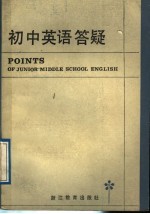

初中英语答疑PDF电子书下载
- 电子书积分:14 积分如何计算积分?
- 作 者:龚星来编
- 出 版 社:杭州:浙江教育出版社
- 出版年份:1985
- ISBN:7533800028
- 页数:408 页
一、名词(Nouns) 1
1·1 hair和hairs的区别 1
·2 There's fish…和There's a fish有什么不同 4
·3 experience和experiences的不同含义 6
·4合成名词的复数形式 10
Exercise 1 12
·5 Mr和Mrs的用法 13
·6 sports meet还是sport meet 17
·7 ten-year-old boy还是ten-years-old boy 18
·8能否说a table's leg 21
·9 怎样说“两个好消息” 25
Exercise 2 29
·10 clothes和clothing的区别 31
Exercise 3 33
·11 at the Doctor's的含义 33
·12 We wrote a composition含义不清 35
二、冠词(Article) 37
2·1用a,还是用an 37
Exercise 4 39
·2 in prison和in the prison有什么不同 40
·3 hit sb.on the nose能否改说成hit sb.'snose 42
·4 in front of…和in the front of…的区别 44
Exercise 5 47
·5 表示职位、头衔的名词前的冠词 48
·6 turn traitor能否改说成turn a traitor 50
·7 the rich为什么译成“有钱人” 52
Exercise 6 54
·8 a和one的不同用法 54
·9能否说a so lovely day 58
Exercise 7 59
·10能否以A whale代替The whale表示类属 61
·11 for the fourth and last time是一次还是两次 65
Exercise 8 68
三、代词(Pronouns) 71
3·1 who能否用作宾格代词 71
·2 be taller than me对不对 75
Exercise 9 78
·3 几个人称代词连用时的次序 79
·4 it能否用来指人 80
·5人称代词he,she能否指代物 83
·6能否说“Everybody has done their…” 85
·7 which,what,who的不同用法 88
Exercise 10 91
·8 any,either,none,neither等所指代的范围 92
·9 some,somebody,something能否用于疑问句 95
Exercise 11 99
·10 one作为代词的用法 101
·11 everyone和every one的区别 105
·12“So he does.”和“So does he.”有什么不同 108
·13(to)do so能代替什么结构 110
Exercise 12 112
四、形容词和副词(Adjectives and Adverbs) 114
4·1 能否说“These guns are wooden.” 114
·2为什么不能说“You're an afraid man.” 117
·3 disappointed和disappointing的区别 120
Exercise 13 124
·4为什么不能说special anything 126
Exercise 14 131
·5 colour和coloured作定语时的区别 132
·6 a wet day怎么译 134
·7 friendly的词性 136
·8多个形容词的先后次序 140
Exercise 15 143
·9 always,usually等词所表示的频度 144
·10频度副词在句子中的位置 147
·11 too,only,also,even等在句子中的位置 151
Exercise 16 156
·12副词down的不同含义 157
·13能否说“The book is two inches thin.” 160
·14 elder和older在用法上的区别 163
·15 cleverer,还是more clever 166
·16 more…than…句型中什么情况下得用上 168
other 168
·17 more than…和more than that(those) of 170
Exercise 17 173
5·1为什么说go hungry,不说go hungrily 175
五、动词句型(Verb Patterns) 175
·2 have it cast中的cast是否原形动词 178
Exercise 18 181
·3 能否说“Please introduceme your friend.” 182
·4“Who teaches your English?”错在哪里 185
·5 常见的可带双宾语的动词 186
·6为什么说“I have made my sister.”语意不完整 190
·7 think it over和go over it中it的位置 192
Exercise 19 196
·8能否说“Who are you talking?” 198
·9 report you和report to you的区别 200
·10 say,speak,talk用法上的不同 202
·11为什么说“Don't be…”,不说“Be not…” 205
Exercise 20 206
六、情态动词(Modal Verbs) 209
6·1 may not能否用来回答“May I...?” 209
·2为什么不能用mustn't回答must开头的问句 211
·3“Since I must die”中的must怎样理解 213
·4 Must能用于一般过去时吗 214
·5 Could和was able to是否可以通用 217
·6 Must be和must have been的不同 220
·7 May和might,can和could用法上的异同 223
Exercise 21 226
7·1 一般现在时表示过去的动作 228
七、时态(Tense) 228
·2“I wish I had...”中的had表示什么意义 230
·3 主句谓语用过去时,宾语从句中能用一般现在时吗 232
·4 改为间接引语时,主句是过去时,原从句的一般过去时能否保持不变 235
·5“Will you be seeing...?”的时态意义 238
·6 一般过去时和过去进行时的区别 241
·7现在进行时表示将来动作 242
·8是have been,还是have gone 244
·9不能说“*We have begun to learn English since 1976.” 246
·10能否说“If you will...I will...” 248
·11过去完成时能否单独成立 250
·12“他三天前就已经买了。”该用什么时态译 252
Exercise 22 254
八、被动语态(The Passive Voice) 258
8·1 “be made to+动词原形”,还是“be made+动词原形” 258
·2“be going to”的被动语态怎样表示 259
·3 动词have能否用于被动语态 261
·4 改为被动句后,原状语、补足语等的句子成分及位置 263
Exercise 23 266
九、介词(Prepositions) 268
9·1 the key to the tank中的to表示什么意义 268
·2“It's kind of you.”中的of怎样理解 271
·3 in the tree还是on the tree 274
·4 in the face,on the nose是否固定搭配 277
Exercise 24 278
·5 shout to him和shout at him的区别 279
·6为什么go on strike不能作“继续罢工”解 283
·7 until和动词的“体(能持续和不能持续)” 285
·8 in an hour还是after an hour 288
Exercise 25 290
·9 be strict with…和be strick in…有何区别 291
·10 by oneself和for oneself怎么用 295
Exercise 26 297
十、否定(Negation) 300
10·1能否说“We don't have plenty of…” 300
·2什么是“部分否定” 302
·3 “我认为不会下雨”这话怎么翻译 304
·4 否定疑问句的意义及其回答 306
·5 no和not的不同否定意味 309
·6 hardly,seldom等词的否定作用 311
·7 few,little和a few,a little的不同含义 313
Exercise 27 315
11·1是定语,还是状语 317
十一、不定式(Infinitive) 317
·2 修饰形容词的不定式的逻辑主语 319
·3 stop blowing和stop to blow有何不同 321
·4什么场合必须用“how+不定式” 324
Exercise 28 326
十二、主谓一致(Subject-verb Concord) 328
12·1 影响谓语动词单复数形式的几种因素 328
·2 主语“no+名词”和谓语的一致 331
·3 主语“neither/either+of-phrase”和谓语的一致 333
·4主语“…or”和谓语的一致 335
·5用and连接的主语不一定是复数 337
·6 the rich同the rest,the other(s)在主谓一致问题上的异同 340
Exercise 29 342
十三、句子(Sentences) 344
13·1 一般疑问句的省略形式 344
·2 陈述句形式的一般疑问句 345
·3 “助动词+主语”的词序不一定表示疑问 346
·4 thirty of them中的thirty指全体还是指部分 349
·5“Here you are.”和“Here it is.”的异同 351
·6 在一问一答之间,数、时态不一致能否成立 353
·7怎样就度量、价值提问 356
·8 什么情况下可用how long,how soon或how often提问 359
·9为什么不能说“Although…,but…”或“Because…,so…” 361
·10反意问句的几个要点 363
Exercise 30 367
十四、翻译(Translation) 368
14·1 and的种种汉译 368
·2 when译为“这时(候)” 371
·3 before除“在……前”之外的译法 374
·4 forty more little men是“四十多个小人”吗 376
·5 a good laugh里的good的译法 377
·6“这支笔写起来流利”的译法 378
·7 There be,have(has)与“有” 381
Exercise 31 385
- 《课堂上听不到的历史传奇 世界政治军事名人 初中版》顾跃忠等编著 2015
- 《初中生英语作文 提高篇》清瑶主编 2019
- 《初中物理知识地图》赵端旭 2017
- 《新课标初中英语词汇同步速记 八年级 上 通用版》蔡波主编 2018
- 《新课标初中英语词汇同步速记 九年级 全1册》蔡波编 2018
- 《基于核心素养的有效学习与学业评价策略 初中政治》李亚莉主编 2018
- 《基于核心素养的有效学习与学业评价策略 初中英语》高婉妮主编 2018
- 《初中英语语法革命 修订版》李义启 2016
- 《新课标初中英语词汇同步速记 七年级 上 通用版》蔡波主编 2018
- 《日有所诵 初中版 八年级》《亲近母语》研究院编著 2015
- 《小学教师之服务与修养》孔庆来编 1936
- 《梦飞度千山》海风吹来编 2013
- 《随机控制题解》郭尚来编 1982
- 《换工作不如换思维》卢孟来编 2009
- 《茄果类蔬菜栽培新技术》晏儒来编 1999
- 《激光拉曼光谱在有机化学上的应用》潘家来编 1986
- 《初中英语答疑》龚星来编 1985
- 《俄汉谚语俗语词典》叶芳来编 2005
- 《露水桌子》张昊,赵欣来编 1993
- 《全国各类成人高等学校招生考试专升本统考教材 高等数学 第2版》李仲来编 2002
- 《培智学校义务教育实验教科书教师教学用书 生活适应 二年级 上》人民教育出版社,课程教材研究所,特殊教育课程教材研究中心编著 2019
- 《浙江海岛植物原色图谱》蒋明,柯世省主编 2019
- 《习近平总书记教育重要论述讲义》本书编写组 2020
- 《办好人民满意的教育 全国教育满意度调查报告》(中国)中国教育科学研究院 2019
- 《教育学考研应试宝典》徐影主编 2019
- 《语文教育教学实践探索》陈德收 2018
- 《家庭音乐素养教育》刘畅 2018
- 《学前教育学》王换成主编 2019
- 《近代体育游戏教育史料汇编 第1辑 1》王强主编 2016
- 《全国学前教育专业(新课程标准)“十三五”规划教材 简谱手风琴教程 第2版》(中国)杨克勤,王宝庆 2019
